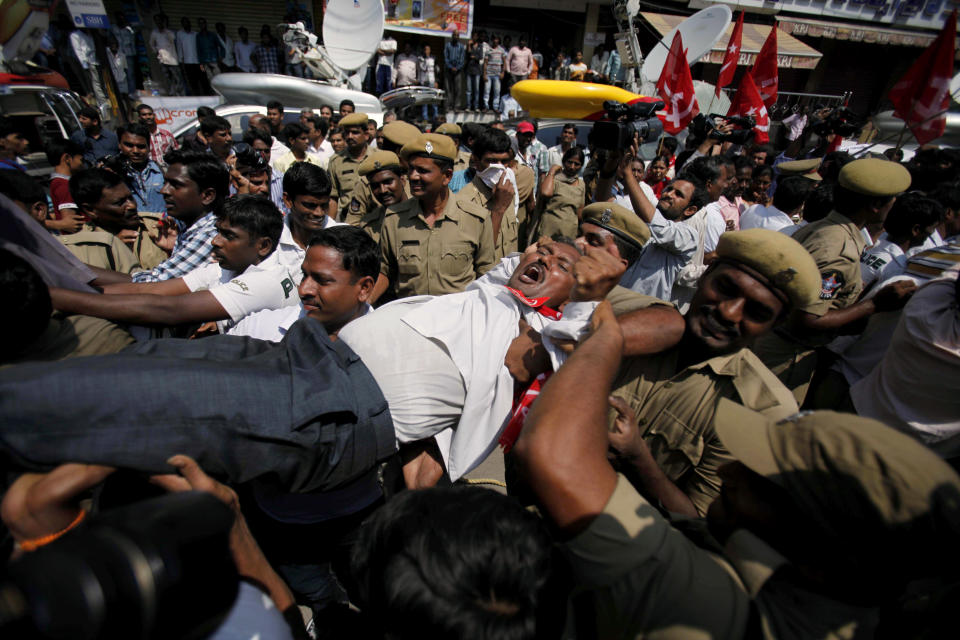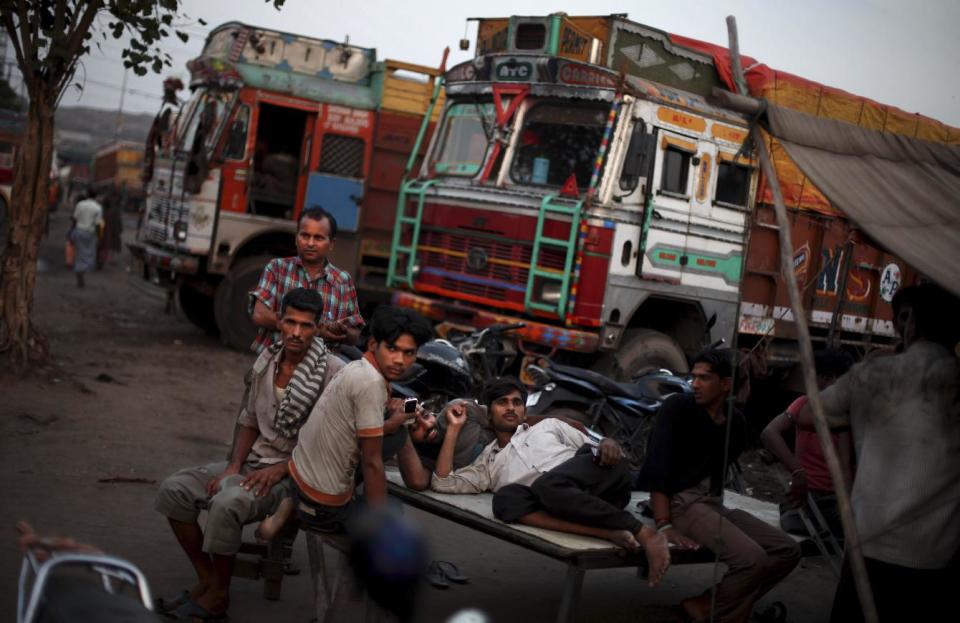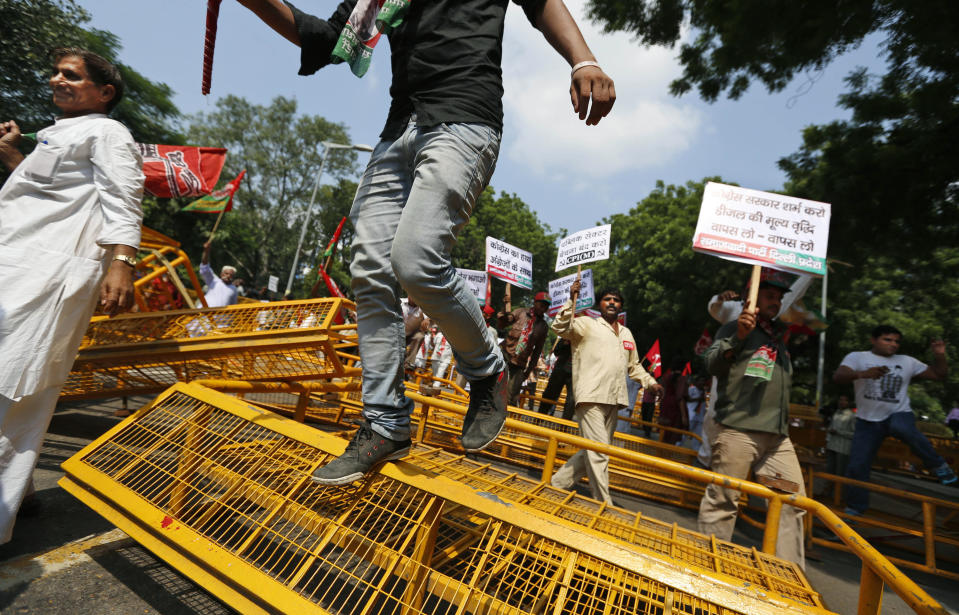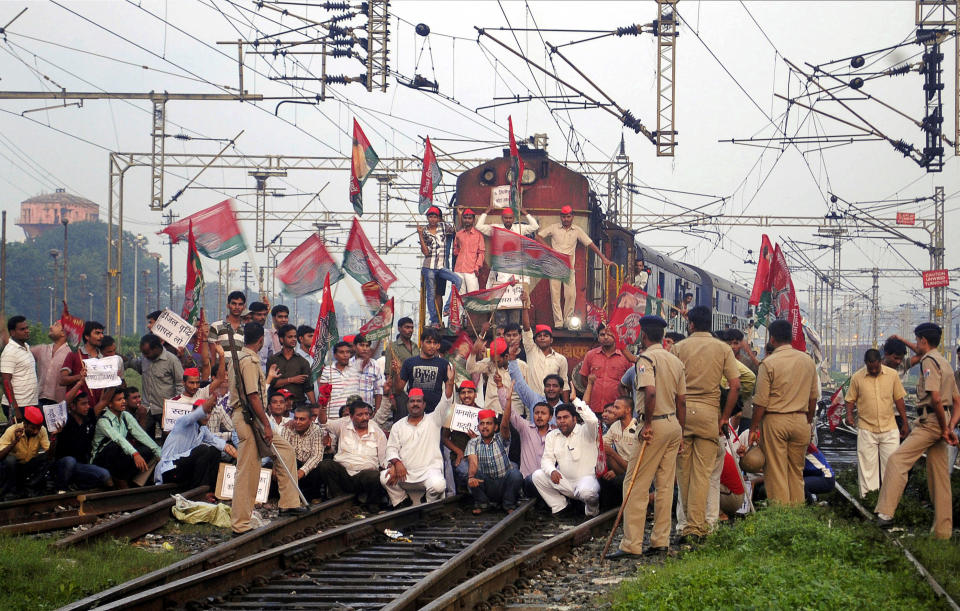Indian strike against reforms shuts trains, shops
NEW DELHI (AP) — Angry demonstrators disrupted trains and forced some shops and schools to close Thursday in a partly successful national strike protesting a government decision to cut fuel subsidies and open India's huge retail market to foreign companies.
Political backlash against the economic reform package presented by the Cabinet last week has left Prime Minister Manmohan Singh's coalition scrambling to shore up its support and prevent early elections.
Some government allies have joined opposition parties in supporting the protests, which closed many schools and kept commercial trucks off the roads. In some states, such as opposition-ruled Gujarat, the strike was widely followed. In other regions, including the main cities of New Delhi and Mumbai, the impact of the protests was scattered. Nevertheless, the Confederation of Indian Industry estimated the country might have lost as much as $2.3 billion in production and trade.
In a signal that the government was on shaky ground, many of the protests in Uttar Pradesh state were led by the Samajwadi Party, which has been supporting the government from outside the fragile ruling coalition. The party, which has been extremely critical of the reform package, postponed a meeting it had called for Thursday evening to determine its next step.
Top ministers downplayed any talk of a teetering government.
"We have enough friends today, we had enough friends yesterday ... so I don't see any reason why you should doubt our stability," Finance Minister Palaniappan Chidambaram told reporters.
Also Thursday, the government notified, or starting setting into law, the Cabinet decisions on foreign direct investment in single-brand retail, multi-brand retail, civil aviation, broadcasting sector and power exchanges, which removes the possibility of any changes.
In Uttar Pradesh and Bihar, protesters blocked railroad tracks. Some burned an effigy of Singh on the tracks, while others carried signs reading "Go Back Wal-Mart," a reference to the U.S. retail giant expected to enter the Indian market under the new regulations.
The region of Jammu, an opposition stronghold, was mostly shut.
In central Delhi, thousands joined protests demanding the government back down.
In a bit of street theater common to Indian demonstrations, about 2,000 people in Delhi marched to a police station and demanded to be detained. Among those who got themselves arrested was Samajwadi Party leader Mulayam Singh Yadav, who walked into the station surrounded by his government-provided security detail.
Law Minister Salman Khurshid said the protesters were only hurting the economy they claimed to be defending.
"I think they've shown their point, they've given their point of view, they've shown their protest," he said. "Now let us get back to work, back to our factories, back to our shops, back to our offices, schools and colleges."
Singh, who came under intense criticism in recent months for presiding over a corrupt and paralyzed government, stunned the country with last week's raft of reforms. The government announced a reduction in massive subsidies for diesel fuel and cooking gas. It also opened up the country's enormous retail sector to foreign competitors, allowed local airlines to sell stakes to foreign carriers and pledged to sell off chunks of four state-run companies.
"It's a very difficult decision for the government," Information Minister Ambika Soni said. "We have tried to assure everybody that there was no other way except to take that decision to keep the economy on track."
Opponents said the fuel hike would spark higher inflation and hurt the country's poor. They said opening up the retail sector to foreign giants would crush the nation's millions of small retail shops.
"India is heading toward economic slavery," Rajnath Singh, a leader of the opposition Bharatiya Janata Party, said during a protest Thursday. He warned that the entry of Wal-Mart would flood India with Chinese-made goods, hurting local farmers, manufacturers and retailers.
The Trinamool Congress party announced it would pull out of the coalition Friday unless the economic package was withdrawn, leaving the ruling Congress party some time to win it back. However, Chidambaram, the finance minister, said the reforms would stand.
If the Trinamool Congress pulled out, India would be left with a minority government dependent on the outside support of either the Samajwadi Party or the Bahujan Samaj Party. The BSP said it would not decide until next month what action to take.
Government officials said they remained confident the government would survive until the next scheduled elections in 2014.
___
Associated Press writer Ashok Sharma contributed to this report.
___
Follow Ravi Nessman on Twitter at www.twitter.com/ravinessman




